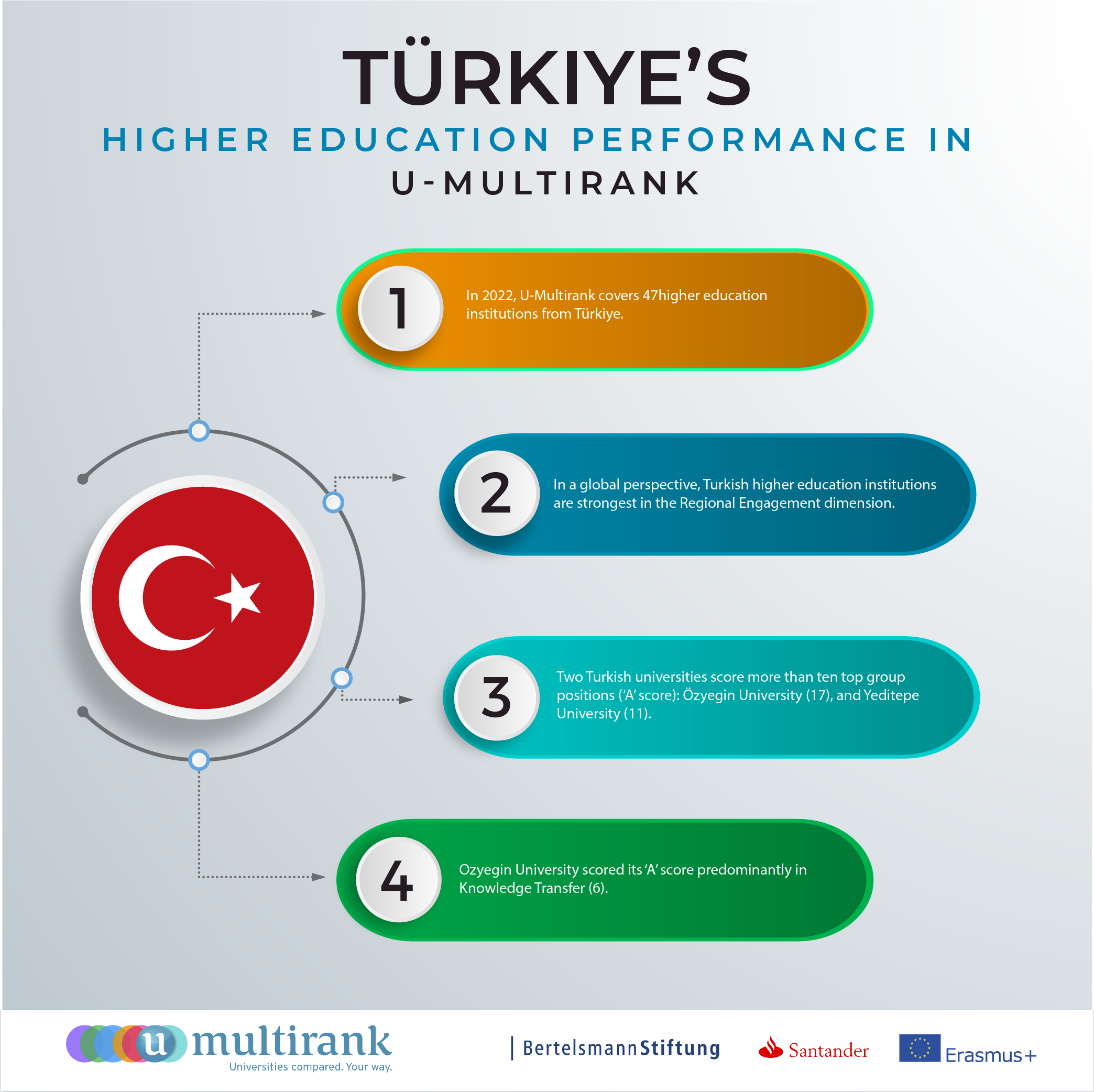How to study in Türkiye?
Türkiye offers many study opportunities for international students at more than 200 institutions and 58,000 courses of your choice. Türkiye is a full member of the Bologna Process / European higher education area since 2001. Accordingly, ECTS is applied in accordance with Europe, and all students are given a Diploma Supplement. Therefore, a diploma received from a Turkish university is recognized in all European countries. Also, Türkiye is an active participant in the Erasmus+ student exchange programme.
Türkiye has a diversified higher education system with different types of institutions: universities, universities of applied sciences, graduate schools, 4-year schools, conservatories, post-secondary vocational schools, and research and application centers.
Türliye’s Higher Education System in International Comparison
In this section, we highlight the overall performance of Turkish universities on the institutional level per U-Multirank dimension. The table below shows the national breakdown of Turkish universities and how they stand across the spectrum of above average (receiving a score of ‘A’ (very good) or ‘B’ (good)), versus below average (receiving a score of ‘D’ (below average) or ‘E’ (weak)). In doing so, U-Multirank offers a clear picture on the country’s strengths and areas for improvement.
It becomes apparent that in general Türkiye 's higher education institutions perform strongest in U-Multirank’s regional engagement dimension.
National performance: Turkey
How much does it cost to study in Türkiye?
In Türkiye , tuition fees are applied differently in public and private universities. In public universities, tuition fees are decided and announced by the Council of Ministers, taking into consideration the type and duration of study in different disciplines, and they range between $80 and $1,500. In private universities, on the other hand, tuition fees are decided by the board of the university, and they range between $5,000 and $20,000.
Tuition fees for international students are fairly affordable and vary depending on the program. Public universities are much cheaper than private institutions in Turkey, as a postgraduate degree at a public university could cost you as little as US$300-800 for a postgraduate qualification. Private universities set their own fees and charge up to $20,000.
At public universities, tuition fees are generally more expensive for study programs in English, ranging from $600-1500 per year, while the same courses in Turkish are around $240-750.
What are the entry requirements for Turkish universities?
Higher education in Türkiye is not that much different from what you’ll find in the EU Bologna system. It is also organised on 3 levels: Bachelor’s, Master’s, and Ph.D.
If you intend to do a Bachelor’s degree in Türkiye , you will need to have graduated from high school or be about to graduate.
If you want to purse a Master's degree or a Ph.D. programme in Türkiye , you will also have to check specific requirements on each programme website.
How to get a Stipend/Scholarship in Türkiye?
No matter the reason, paying high tuition fees can be a source of stress for many. However, there are many options for financing your studies, including the use of scholarships. There are various scholarship opportunities available for international students looking to study in Türkiye . Depending on your country of origin and the level of studies, there are different options for funding. To explore what scholarship options are available, check this scholarship database.
Do I need a Student Visa for Türkiye?
In Türkiye , foreigners who will stay longer than the visa/ visa exemption period for 90 days will be required to obtain a residence permit. This process can be done at the Turkish consulate or embassy in your home country before arriving in Turkey. After receiving a visa, it is possible to register as a student as well as being able to receive a residency permit. For more information on visa requirements for students, please click here.
How do Austrian Universities fare in U-Multirank?
- In 2022, U-Multirank covers 47 higher education institutions from Türkiye
- In a global perspective, Turkish higher education institutions are strongest in the Regional Engagement dimension
- Two universities from Türkiye score more than ten top group positions (‘A’ score): Özyegin University (13), and Yeditepe University (11).
- Özyegin University scored its ‘A’ scores predominantly in Knowledge Transfer (6).
Here you can find the full 2022 country report on Türkiye.

What to study in Turkey?
Where to study in Turkey?
Consumer Basket
Main course
50.00 TL
Drinks
30.00 TL
One-way ticket
6.70 TL
Cinema ticket
41.00 TL
Useful vocabulary
Hello
Merhaba
Bye
Hoşçakal / Güle güle
Thanks
Teşekkürler
Please
Lütfen




